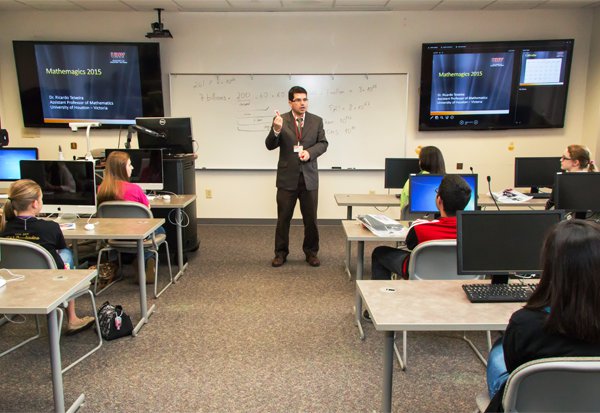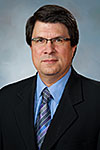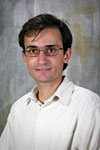UHV to use Alcoa Foundation grant to start math camp, programming course
 |
| Ricardo Teixeira, a UHV assistant professor of mathematics, gives a "mathemagics" presentation during the 2015 Math & Robotics Awareness Day. In summer 2016, Teixeira will teach a math camp, one of two new programs made possible by a $20,000 grant from Alcoa Foundation. |
A grant from Alcoa Foundation will pave the way for two new learning opportunities for area high school students, in addition to continued funding for a popular robotics course, summer camp and Math & Robotics Awareness Day.
 |
| Jeffrey Di Leo |
Alcoa Foundation has awarded a $20,000 grant to the University of Houston-Victoria for the 2015-2016 school year. A portion of the grant will allow high school students to participate in a yearlong C++ programming course and a weeklong math camp in summer 2016.
“With the assistance of Alcoa Foundation, we’ve been able to help area high school and middle school students advance their skills and provide valuable insight into math, computer science, robotics and engineering careers,” said Jeffrey Di Leo, dean of the UHV School of Arts & Sciences. “These new elements will further equip young people with the knowledge needed to thrive in higher education and beyond.”
The C++ course will be offered to 12 high school students during the 2015-2016 school year. It will cover the fundamentals of programming. C++ is a high-level programming language that falls in between what humans understand as language and what a computer understands as language.
“Students who plan to do anything with programming, engineering, computer science, mathematics or electrical engineering need to take a series of courses about fundamental programming,” said Alireza Tavakkoli, director of the UHV digital gaming and simulation program and an assistant professor of computer science. “Learning about fundamentals of programming using the C++ language is a required series of courses at UHV and many other universities.”
 |
| Alireza Tavakkoli |
The course will be broken into two parts, with the first part in the fall semester and the second section in the spring. In the fall, students will learn about structural programming and how to use variables and memory management techniques. Other lessons will focus on repetitive elements, such as loops and functions. In the spring, students will learn deeper concepts, including dynamic memory management, pointers, recursion, and classes and objects.
“This type of instruction was something that was missing in Victoria,” Tavakkoli said. “A lot of local students are interested in engineering and computer-related fields, and this will be an asset in getting them prepared.”
The C++ course will be separate from the yearlong robotics course, but some students may elect to take both, Tavakkoli said.
In the robotics course, students learn to build and program autonomous robots. The yearlong course will be offered to 24 students in 2015-2016, a dozen from high schools and a dozen from middle schools. It’s the first time middle school students will be able to take the course. The inclusion was based on requests from middle school teachers who saw the benefits, Tavakkoli said.
The 2016 Digital Simulation and Robotics Summer Camp will introduce a dozen students to basic concepts in robotics, simulation and engineering. The success of the robotics camp inspired the addition of a math summer camp. Six students will learn theoretical concepts in geometry and will increase their knowledge in mathematical modeling, probability and other areas.
“We need to encourage more students to study mathematics,” said Ricardo Teixeira, UHV assistant professor of mathematics and director of the mathematics and core curriculum programs. “This is a great opportunity for students to learn a deeper level of mathematics in a fun setting.”
Teixeira said mathematics sometimes is regarded by younger generations as a dull subject. The camp will show why it is not. Teixeira plans to incorporate magic tricks and lessons that relate to real-life situations.
Like the robotics campers, the math campers will stay in UHV residence halls during the week.
“Having a place to stay will help us attract students from areas outside of Victoria,” Teixeira said. “But even if the camper is from Victoria, we will encourage him to stay in the dorms so he can experience college life.”
Teixeira said the campers will work on a presentation for the 2017 Annual Math & Robotics Awareness Day. Students from across the Crossroads have explored different aspects of math and robotics at the Annual Math & Robotics Awareness Day for the past two decades, which is also sponsored by Victoria College. The 2015 event in April attracted 240 high school and middle school students.
Tavakkoli said when he first arrived at UHV in 2009, the goal was to expand what was then called Math & Computer Science Awareness Day.
“It was noble that we brought everyone on campus for one day, so they can compete and see what college is like,” he said. “But at the time, we thought about making it a sustainable process that we could start at the beginning of the year and work with students throughout the year to guide them down a path. Now we’re entering the fifth year of the robotics course. It’s been a success. The grant from Alcoa Foundation has been immensely helpful.”
For information about UHV’s programs funded by Alcoa Foundation’s grant, visit hsrobotics.aiatuhv.com.
The University of Houston-Victoria, located in the heart of the Coastal Bend region since 1973 in Victoria, Texas, offers courses leading to more than 80 academic programs in the schools of Arts & Sciences; Business Administration; and Education, Health Professions & Human Development. UHV provides face-to-face classes at its Victoria campus, as well as an instructional site in Katy, Texas, and online classes that students can take from anywhere. UHV supports the American Association of State Colleges and Universities Opportunities for All initiative to increase awareness about state colleges and universities and the important role they have in providing a high-quality and accessible education to an increasingly diverse student population, as well as contributing to regional and state economic development.
Jeremy Shapiro
361-570-4350




